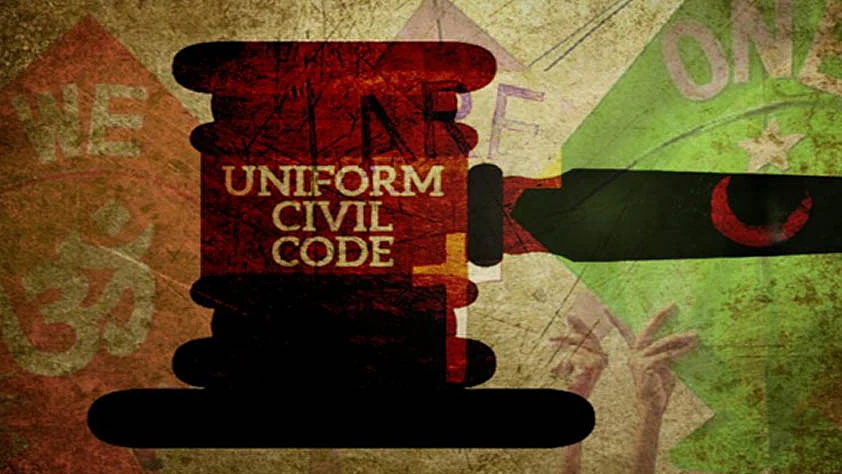UCC: ‘Neither Desirable Nor Necessary‘
Why the 21st Law Commission reiterated this grim warning about the uniform civil code

Where is the draft of the uniform civil code that the prime minister and the BJP want to turn into law? What is in it? While the dog whistles on the code increase in volume with the next general election barely 10 months away, nobody knows what the code actually looks like.
If there is a draft, and one assumes the RSS has one ready, it remains under a veil of secrecy. Even BJP-ruled states like Uttarakhand, Gujarat, Uttar Pradesh and Madhya Pradesh, supposedly committed to a uniform civil code, do not seem to have one.
Nor is there any clarity on whether the states, which can pass bills related to personal laws, want separate codes in each state or are waiting for Parliament to enact a single code for the entire country. One can legitimately ask after the reasons for such reticence. If the code is to be implemented, surely people need to know what is in it?
The promise of a uniform code on marriage, divorce, maintenance, inheritance, succession, etc., has been on the BJP’s manifesto for as long as one can remember. Yet neither the RSS nor the BJP has ever presented such a draft for deliberation or discussion.
Also Read: Why the Uniform Civil Code is a red rag
What kind of a code is the BJP supporting, then, and which is the code they say others are opposing? If the Opposition is using it to ‘mislead Muslims’, why doesn’t the prime minister clarify what is the actual code? The BJP has the numbers in Parliament to possibly get a uniform civil code approved.
But nine years in power, and it is only now that the party and the prime minister have again woken up. Why so late? The BJP government had in 2016 last prodded the 21st Law Commission, which it had constituted, to submit a report on the uniform code.
Two years later, the Commission had declared that a uniform civil code was ‘neither necessary nor desirable’. Undeterred by this conclusion, the 22nd Law Commission has again this June been prompted to ask people for their opinions (within a month) by way of ‘consultation’.
Tribal groups in Jharkhand, 32 of them, and in Nagaland, besides the Mizoram Assembly and the All India Muslim Personal Law Board have expressed their reservations. Significantly, though, neither the Commission nor the government has called any meeting of Opposition parties or leaders of civil society opposed to the idea to allay doubts, to build consensus.
Also Read: Why the Uniform Civil Code is a red herring
Instead, the prime minister appears deaf to the public discourse. While the Opposition and liberal commentators are rightly appalled at his attempt to turn this into another political slugfest, a cynical ploy with elections looming on the horizon, Modi may well be surprised to learn that significant sections of the Muslim community and various women’s groups actually favour further reforms in personal laws for both Hindus and Muslims.
The prime minister conveniently forgets that Hindu women of reproductive age are still barred from entering the Sabarimala temple despite the Supreme Court’s 2018 ruling that the ban violates the fundamental right to equality.
But he cannot be oblivious to the recent controversy over the president of India Droupadi Murmu being kept away from the sanctum sanctorum of the Jagannath temple in New Delhi’s Hauz Khas. When it was pointed out that at least two BJP leaders, both men, had been allowed inside, the priests brazenly declared that they alone were arbiters of who entered the sanctum sanctorum—their word, not the Constitution, was final.
BJP leaders, including the prime minister, have no time to condemn or even question such discriminatory practices. Child marriages, bigamy among Hindus, social and religious discrimination directed at Dalits continue unabated despite the law and the Constitution. Yet these too come under the ambit of a uniform civil code.
The prime minister and the BJP leaders seem to believe that a uniform civil code is just a framework to strategically malign Muslim personal laws and customs. The actual incidence of triple talaq was rare among Muslims and the Supreme Court had declared it unlawful. Yet the government resurrected the dead letter and criminalised it amidst drumrolls to mint political capital.
Several progressive Muslims, meanwhile, have cited gender-just provisions in the personal laws of Islamic countries like Indonesia, Morocco and Tunisia. They have pointed out that a large number of them live, study and work in Western democracies, governed by a common law.
Why, then, would they object to laws which are equitable, just and fair? (Hint: perhaps because this spectre of an Indian ‘uniform’ civil code is likely to be unfair?) Women’s groups too support reforms to allow unhindered entry of women into places of worship, protect women against marital rape and enable them to freely marry a person of their choice.
Yet if the government tries to impose certain Hindu upper-caste practices and injunctions mentioned in the Manusmriti on the whole country, then responsible, equitable sections of the public should resist it.
But the government is not serious about the uniform civil code. It merely wants an electoral issue it can milk for political dividends. Or, our unpredictable prime minister may yet decide to spring a half-baked code on Parliament before the election and claim he has fulfilled the BJP manifesto.
In either case, the country cannot afford to let this too-clever-by-half clique get away with its machinations. If the leadership is serious about a uniform code, the BJP must present a draft early enough to for the people and Parliament to deliberate on it at length.
Follow us on: Facebook, Twitter, Google News, Instagram
Join our official telegram channel (@nationalherald) and stay updated with the latest headlines